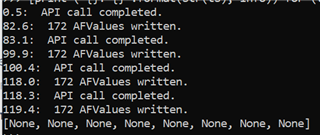We're creating a PIthon program (PI AF SDK using Python) that queries time series data from a Web API and writes to AF Attributes using AFListData.UpdateValues.
The program performs a separate call for each of four measurement points, and the first call takes far longer than the second one.
Below is a heavily redacted code sample and a screenshot of the output.
Code sample:
import requests
import os
import sys
import clr
import configparser
import time
from datetime import datetime, timedelta
from System.Collections.Generic import List as ListNet
from System import DateTime as datetimeNET
start_time = time.time()
# afobjsmeasidlookup is a Python dictionary<integer, AFAttribute>.
[print(measid, attribute) for measid, attribute in afobjsmeasidlookup.items()]
for measid in afobjsmeasidlookup:
apiURL = apiURLBase + r"/api/measurements/{}/data?start={}".format(str(measid), dateLookback.strftime("%Y-%m-%d"))
apiResponse = requests.get(apiURL, headers = headers, verify=sslVerify)
vals = apiResponse.json()
milestones.append((round((time.time() - start_time), 1), " API call completed."))
# values, tsnet, stats and uoms will be used in AFValues constructor.
values = [meas['avg'] for meas in vals]
tsnet = [datetimeNET.Parse(str(meas['timestamp'])) for meas in vals]
stats = [AFValueStatus.Good]*len(values)
for afatt in afobjsmeasidlookup[measid]:
uoms = [afatt.DefaultUOM] * len(values)
theseafvals = AFValues(values, tsnet, stats, uoms)
theseafvals.Attribute = afatt
AFListData.UpdateValues(theseafvals, AFUpdateOption.Replace)
milestones.append((round((time.time() - start_time), 1), " {} AFValues written.".format(str(theseafvals.Count))))
[print ("{}: {}".format(str(ts), info)) for (ts, info) in milestones]
Output from line 32:

A look at the afobjsmeasidlookup dictionary:

Is the problem related to the initial call having to first establish a connection to the PI Data Archive or AF server?

